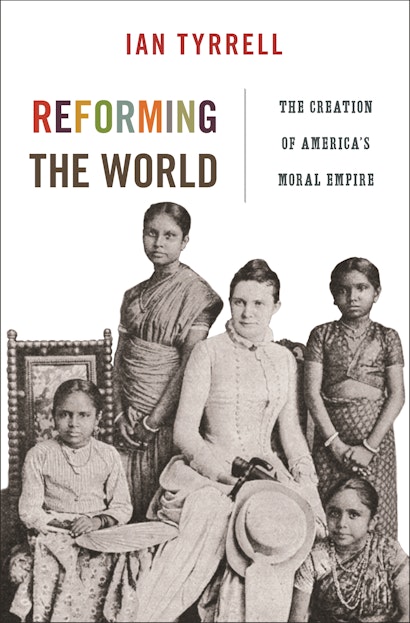Reforming the World offers a sophisticated account of how and why, in the late nineteenth and early twentieth centuries, American missionaries and moral reformers undertook work abroad at an unprecedented rate and scale. Looking at various organizations such as the Young Men’s Christian Association and the Student Volunteer Movement for Foreign Missions, Ian Tyrrell describes the influence that the export of American values had back home, and explores the methods and networks used by reformers to fashion a global and nonterritorial empire. He follows the transnational American response to internal pressures, the European colonies, and dynamic changes in global society.
Examining the cultural context of American expansionism from the 1870s to the 1920s, Tyrrell provides a new interpretation of Christian and evangelical missionary work, and he addresses America’s use of “soft power.” He describes evangelical reform’s influence on American colonial and diplomatic policy, emphasizes the limits of that impact, and documents the often idiosyncratic personal histories, aspirations, and cultural heritage of moral reformers such as Margaret and Mary Leitch, Louis Klopsch, Clara Barton, and Ida Wells. The book illustrates that moral reform influenced the United States as much as it did the colonial and quasi-colonial peoples Americans came in contact with, and shaped the architecture of American dealings with the larger world of empires through to the era of Woodrow Wilson.
Investigating the wide-reaching and diverse influence of evangelical reform movements, Reforming the World establishes how transnational organizing played a vital role in America’s political and economic expansion.
"The book is well crafted, and the multiple threads laid out at the beginning are carefully and subtly woven into a tight and coherent narrative, allowing the reader to enjoy the thrill of recognition as well the blossoming awareness of the entangled nature of the moral reform movement in American imperialism. . . . Tyrrell has managed to create a book full of tensions and questions which the reader is drawn into, engages in, and emerges from with a broader understanding of, and critical insight into, this phase of American imperialism."—Diese Rezension, H-Soz-u-Kult
"In a study both thorough and perceptive, Tyrrell coves the global impact of reformist Protestant missionary efforts from the 1870s to the 1920s."—Choice
"This book will be of particular interest to transnational scholars, diplomatic historians, religious historians, and anyone curious about the origins of international humanitarianism. . . . [T]his study does a superb job demonstrating the manner in which moral reform influenced the United States as thoroughly as it did the foreign peoples American missionaries set out to save."—Amy S Greenberg, American Historical Review
"Reforming the World is a highly readable, sophisticated analysis of transnational American reform networks that draws on a wide range of primary sources. The book makes a powerful argument about the contributions of interconnected evangelical reformers to the shaping of American empire."—Barbara Reeves-Elllington, H-Soz-u-Kult
"This is a finely crafted study grounded in careful analysis of a wide range of manuscript and newspaper sources. It will help to bridge the gap that too often exists between historians of American foreign affairs and historians of American Protestant missions."—Brian Stanley, Journal of Church and State
"One would be hard pressed to find an instance where Tyrrell's evidence does not speak to increased transnational, multidirectional flows of people and ideas. Moreover, Tyrrell rightly assesses Progressive Era evangelicals as complicated creatures whose ideas and actions were not informed by narrow or dogmatic notions of religion but rather reflected all manner of political and cultural circumstances and processes. Like any powerful work of world historical inquiry, Tyrrell's argument resonates with present global circumstances."—Clif Stratton, Journal of World History
"Tyrrell's work exemplifies the methods and complexity of transnational approaches to history. . . . [S]pecialists will find this book an important contribution to the historical study of imperialism and missions."—Lisa J. Pruitt, Journal of American History
"Reforming the World, a dispassionate but deeply original work, puts American Protestant missionaries at the center of the struggle against the opium traffic."—David T. Courtwright, Journal of the History of Medicine and Allied Sciences
"Tyrrell, one of the leading figures in the field of transnational history, suggests we best understand the story of the United States if it is placed in an international context. With spectacular research, he recasts the way we look at U.S. history, by placing definitions of nationhood in a transnational context and by making the culture of moral reform the fount of the foreign policy of the era."—Bruce Kuklick, University of Pennsylvania
"This carefully documented book is a singular contribution to U.S. history. I know of no other work on American reform movements that engages as well as this one the vast enterprise of missions. It reminds today's readers of the power that the so-called liberal Protestant establishment once had in American public life."—David Hollinger, University of California, Berkeley

